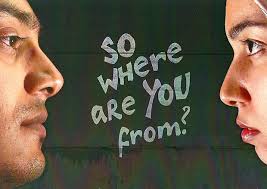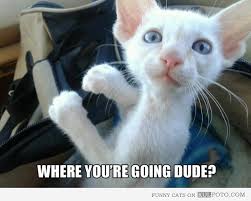The Four Questions

Passover was celebrated by our small family this year, and since grandson Adam is 2 1/2 years old, the task of the youngest child asking the four questions still rests on my daughter Erica's shoulders. Plus, she took Hebrew in college.
Today I read about four other questions which Native American cultures ask of those who come to be healed:
Who are you?
Where did you come from?
Why are you here?
Where are you going?
These are powerful questions. I reacted strongly to each of them. Some are asked by other spiritual paths, but not usually in the context of physical healing. What makes them remarkable is that they reveal that healing is a body-mind-spiritual enterprise. This ancient method brought the stricken person to create and verbalize his self-created identity.
Some might read this activity as privileging the ego with all of its defenses, ill-conceived self-notions, grandiosity or rationalizations. I agree with the creator of Narrative Medicine that regardless of what the patient says to the healer, or the healer receives from the patient, they are both treading within stories created within a cultural tapestry.
I'm going to use a real situation that is currently facing me, and how all four of the questions listed above come into the dyad of me and the healer.
QUESTION ONE: WHO ARE YOU?

My hands have been shaking for some time now. I don't know why. All my family and friends have noted the tremor, and I was embarrassed at dinner last week when I attempted to eat soup with my spoon. It slopped all over the tablecloth and my slacks. I do not feel "myself", I do not feel whole. I have answered the first question of "who are you?" I am a female whose hands have not shaken before. This is "not me."
I, as the patient, have chosen a specific individual because I believe she has the answer to how to make me whole once again. Rid me of this tremor that is "not me" and I will re-emerge whole, healed. But who else am I? If my attention is called to the tremor, then I am the woman with shaking hands. If my joints hurt yesterday, then that is who I am, the woman whose knees and shoulder joints hurt. If we took a moment-by-moment snapshot of where our attention rests at any second, then that is who I am. So who am I? All of these sensations that I have adopted as coming from this sense of self, and yet none of them, since once my attention strays, I am someone else.
When I go to the doctor, I have to decide where to rest my attention. sometimes where I have concentrated my attention is not what the doctor is trained to see. In 2011 while undergoing chemotherapy, I self-diagnosed a wicked sinus infection and spiked a fever. Off to the ER I went, confident I knew who I was---the lady with the sinus infection, who needed antibiotics.
As the nurse put the blood pressure cuff on my right arm, I loudly yipped in pain. She looked at me quizzically, and then at the cuff. Her attention centered on a red lump below my elbow in my inner arm.
"What's that?" she asked.
"Oh, I can't lift anything with my left arm since my mastectomy, so I pulled a muscle in my right arm. It's been hurting for a while. Now about my sinus..."
She wasn't particularly interested in the throbbing cavities under my eyes, or the 101 degree fever she noted on my chart. Instead, she told me she was calling in a vascular specialist. She was sure that the red golf-ball sized lump on my arm was a blood clot.
It was, and thus began a year of injecting coumadin (rat poison) into my stomach for a year to make sure that the clot dissolved and no more erupted.
So who was I that night? To my self-sense, I was an ordinary sinus infection. I knew from my knowledge of my own medical history that I got sinus infections once in a while, and this felt like the same symptoms I usually registered. I had no experience with blood clots, didn't know they could erupt in the arm, that they are not infrequent if you are on chemotherapy, and had constructed a common-sense narrative for what I saw on my arm.
To the skilled senses of the medical practitioner, I was "the blood clot in Room 2," a person with ailments she had been trained to examine impersonally in accordance with medical protocols.
Inherently, I was both and neither.
QUESTION TWO: WHERE DID YOU COME FROM?

In my upcoming book INTEGRAL HEALING I have written at great length about my family of origin, since that is "where I came from," in the sense of both physical inheritance of genetic proclivities, and of how life was constructed for me as a young child, and held in my mind as what "reality" was all about.
I was taught not to be a burden to my mother or her sisters, since their lives were so melodramatic and "tragic." I was never to ask them to turn up the air conditioner if I were sweating in the house, because they felt comfortable in that temperature and my desires were not worth considering.
Fast forward to May, 2011. I have come to Sloan-Kettering's Pain Management Department to see the doctor. Since my thoracotomy for lung cancer that January, I have been in intolerable pain since then, even while taking ibuprofin.
The doctor with the sad eyes asked me, "Where have you been since January? There was no need for you to be in intolerable pain! We have wonderful drugs for you that will alleviate your suffering."
Through tears, I just shook my head ruefully. "I didn't know I could come to you. I thought you people just got patients off of drugs, not gave them to us."
Now it was his turn to look crestfallen. "Why do cancer patients not come see me sooner? This happens to us all the time. There is no reason for this to continue"
He prescribed me heavy opioids which I used for 18 months, and then one day I realized I was pain-free, and threw them all away.
So where did I and the other cancer patients come from, with the misunderstanding that we had no alternative except to suffer?
A culture that tells us our own needs are not worthy of being addressed.
A culture where all we see on TV are ads for addiction centers, and we figure the doctors are afraid to give us drugs lest we all become addicts.
A culture where we get the message that we need to tough it out, stiff upper lip, don't be a weenie, quit complaining.
QUESTION THREE: WHY ARE YOU HERE?
 I have a friend whose mother died of breast cancer at an early age. My friend refused to get her own physical or a mammogram. It wasn't until I badgered her and promised that I would go with her that she scheduled an appointment. She was just fine, and now her doctor has a baseline for a normal scan.
I have a friend whose mother died of breast cancer at an early age. My friend refused to get her own physical or a mammogram. It wasn't until I badgered her and promised that I would go with her that she scheduled an appointment. She was just fine, and now her doctor has a baseline for a normal scan.
Another friend's mother felt the lump months before, and feared the news if she went to have it examined. So she delayed almost a year, and when she was finally seen, it had spread. She died three months later.
Angelina Jolie had a double mastectomy. The number of breast exams soared after her news was made public. Robin Roberts of ABC News comes into people's homes for years and follow her breast cancer success story. Then they hear her disclose her next medical situation, and they pay attention. Katie Couric's husband died for lack of having a screening colonoscopy. As icky as the whole procedure is, she educates the public about the needless deaths from fear of the screening.
You read or wrote a book about cancer, spoke at a community meeting about your own diagnosis, ran in a run to raise awareness of a specific illness, or heard about a co-worker currently in treatment.
Whatever tips the public's awareness to illness, it serves all of us. There is one less death to mourn, one less family crushed by a loss, one less company bereft of its key worker, one less loss to the universe of that person's unique talents and contributions.
QUESTION FOUR: WHERE ARE YOU GOING?
 For those who have personally been touched by cancer or other serious illness, this is a crucial, life-transforming question that comes into consciousness at some time: WHAT DID ALL OF THIS MEAN? To me, my family, the medical community, my faith, on and on and on....
For those who have personally been touched by cancer or other serious illness, this is a crucial, life-transforming question that comes into consciousness at some time: WHAT DID ALL OF THIS MEAN? To me, my family, the medical community, my faith, on and on and on....
You have ended treatment. Now what? What is your next step? I have acquaintances who couldn't wait to suppress the entire episode. They told no one but their immediate family. I make no judgment about them. As I've noted before, everyone has their singular coping mechanism. Mine is to share, to reach out and try to let my pain and story be of benefit to another.
But even if you decide not to tell your story or do not wish to remember what you have been through, you are changed, like it or not. In your own unique way, you have resolved the question of your illness's meaning.
Some might read this activity as privileging the ego with all of its defenses, ill-conceived self-notions, grandiosity or rationalizations. I agree with the creator of Narrative Medicine that regardless of what the patient says to the healer, or the healer receives from the patient, they are both treading within stories created within a cultural tapestry.
I'm going to use a real situation that is currently facing me, and how all four of the questions listed above come into the dyad of me and the healer.
QUESTION ONE: WHO ARE YOU?
My hands have been shaking for some time now. I don't know why. All my family and friends have noted the tremor, and I was embarrassed at dinner last week when I attempted to eat soup with my spoon. It slopped all over the tablecloth and my slacks. I do not feel "myself", I do not feel whole. I have answered the first question of "who are you?" I am a female whose hands have not shaken before. This is "not me."
I, as the patient, have chosen a specific individual because I believe she has the answer to how to make me whole once again. Rid me of this tremor that is "not me" and I will re-emerge whole, healed. But who else am I? If my attention is called to the tremor, then I am the woman with shaking hands. If my joints hurt yesterday, then that is who I am, the woman whose knees and shoulder joints hurt. If we took a moment-by-moment snapshot of where our attention rests at any second, then that is who I am. So who am I? All of these sensations that I have adopted as coming from this sense of self, and yet none of them, since once my attention strays, I am someone else.
When I go to the doctor, I have to decide where to rest my attention. sometimes where I have concentrated my attention is not what the doctor is trained to see. In 2011 while undergoing chemotherapy, I self-diagnosed a wicked sinus infection and spiked a fever. Off to the ER I went, confident I knew who I was---the lady with the sinus infection, who needed antibiotics.
As the nurse put the blood pressure cuff on my right arm, I loudly yipped in pain. She looked at me quizzically, and then at the cuff. Her attention centered on a red lump below my elbow in my inner arm.
"What's that?" she asked.
"Oh, I can't lift anything with my left arm since my mastectomy, so I pulled a muscle in my right arm. It's been hurting for a while. Now about my sinus..."
She wasn't particularly interested in the throbbing cavities under my eyes, or the 101 degree fever she noted on my chart. Instead, she told me she was calling in a vascular specialist. She was sure that the red golf-ball sized lump on my arm was a blood clot.
It was, and thus began a year of injecting coumadin (rat poison) into my stomach for a year to make sure that the clot dissolved and no more erupted.
So who was I that night? To my self-sense, I was an ordinary sinus infection. I knew from my knowledge of my own medical history that I got sinus infections once in a while, and this felt like the same symptoms I usually registered. I had no experience with blood clots, didn't know they could erupt in the arm, that they are not infrequent if you are on chemotherapy, and had constructed a common-sense narrative for what I saw on my arm.
To the skilled senses of the medical practitioner, I was "the blood clot in Room 2," a person with ailments she had been trained to examine impersonally in accordance with medical protocols.
Inherently, I was both and neither.
QUESTION TWO: WHERE DID YOU COME FROM?
I was taught not to be a burden to my mother or her sisters, since their lives were so melodramatic and "tragic." I was never to ask them to turn up the air conditioner if I were sweating in the house, because they felt comfortable in that temperature and my desires were not worth considering.
Fast forward to May, 2011. I have come to Sloan-Kettering's Pain Management Department to see the doctor. Since my thoracotomy for lung cancer that January, I have been in intolerable pain since then, even while taking ibuprofin.
The doctor with the sad eyes asked me, "Where have you been since January? There was no need for you to be in intolerable pain! We have wonderful drugs for you that will alleviate your suffering."
Through tears, I just shook my head ruefully. "I didn't know I could come to you. I thought you people just got patients off of drugs, not gave them to us."
Now it was his turn to look crestfallen. "Why do cancer patients not come see me sooner? This happens to us all the time. There is no reason for this to continue"
He prescribed me heavy opioids which I used for 18 months, and then one day I realized I was pain-free, and threw them all away.
So where did I and the other cancer patients come from, with the misunderstanding that we had no alternative except to suffer?
A culture that tells us our own needs are not worthy of being addressed.
A culture where all we see on TV are ads for addiction centers, and we figure the doctors are afraid to give us drugs lest we all become addicts.
A culture where we get the message that we need to tough it out, stiff upper lip, don't be a weenie, quit complaining.
QUESTION THREE: WHY ARE YOU HERE?
Another friend's mother felt the lump months before, and feared the news if she went to have it examined. So she delayed almost a year, and when she was finally seen, it had spread. She died three months later.
Angelina Jolie had a double mastectomy. The number of breast exams soared after her news was made public. Robin Roberts of ABC News comes into people's homes for years and follow her breast cancer success story. Then they hear her disclose her next medical situation, and they pay attention. Katie Couric's husband died for lack of having a screening colonoscopy. As icky as the whole procedure is, she educates the public about the needless deaths from fear of the screening.
You read or wrote a book about cancer, spoke at a community meeting about your own diagnosis, ran in a run to raise awareness of a specific illness, or heard about a co-worker currently in treatment.
Whatever tips the public's awareness to illness, it serves all of us. There is one less death to mourn, one less family crushed by a loss, one less company bereft of its key worker, one less loss to the universe of that person's unique talents and contributions.
QUESTION FOUR: WHERE ARE YOU GOING?
You have ended treatment. Now what? What is your next step? I have acquaintances who couldn't wait to suppress the entire episode. They told no one but their immediate family. I make no judgment about them. As I've noted before, everyone has their singular coping mechanism. Mine is to share, to reach out and try to let my pain and story be of benefit to another.
But even if you decide not to tell your story or do not wish to remember what you have been through, you are changed, like it or not. In your own unique way, you have resolved the question of your illness's meaning.
No comments:
Post a Comment